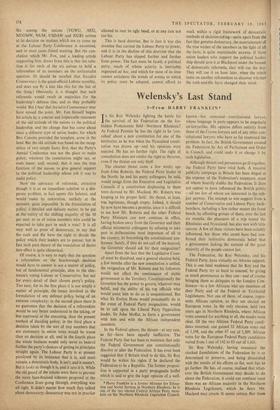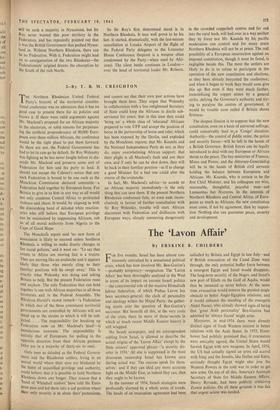Welensky's Last Stand
1—From HARRY FRANKLIN* T s Sir Roy Welensky fighting the battle for 'the survival of his Federation on the for- bidden Protectorate field—Northern Rhodesia? As Federal Premier he has the right to be 'con- sulted' about a new constitution for one of the territories, as he was when the Nyasaland consti- tution was drawn up—and his opinions were rejected. He has no further right. The right of consultation does not confer the right to threaten, even if the threats are only bluff.
The clearest threat came a few weeks ago from John Roberts, the Federal Party leader in the North; he and his party colleagues, he said, would resign from the Executive and Legislative Councils if a constitution displeasing to them were decreed by Mr. Macleod. Mr. Roberts was keeping to his proper field : his threat, at least, was legitimate, though empty. Indeed, it should by now have become a promise, since it is difficult to see how Mr. Roberts and the other Federal Party Ministers can now continue in office, having broken away from the Governor and their official ministerial colleagues by refusing to take part in deliberations most important of all to the country, by boycotting the constitutional con- ference. Surely, if they do not call off the boycott, the Governor should ask for their resignation?
Apart from the fact that the Legislative Coun- cil must be dissolved, and a general election held, a few months after the new constitution is settled, the resignation of Mr. Roberts and his followers would not affect the continuance of stable government in the Territory. Constitutionally the Governor has the power to govern, whatever may befall, and the ability of his top officials who would assist him to do so is unquestioned. But what Sir Evelyn Hone would presumably do in the event of Federal Party resignations, would be to call upon the Liberal Party Opposition leader, Sir John Moffat, to form a government with him and with the African independent members.
In the Federal sphere, the threats—at any rate, so far—have been equally ineffective. The Federal Party line has been to maintain that only the Federal Government can constitutionally dissolve or alter the Federation. It has even been suggested that if Britain tried to do this, Sir Roy would be within his rights if he declared the Federation to be a Republic. The former proposi- tion is supported in a party propaganda leaflet which is said to give the legal opinion of a well- • Harry Franklin is a former Minister for Educa- tion and Social Services in Northern Rhodesia; he is one of the two elected Central African Party mem- bers on the Northern Rhodesia Legislative Council. known---but unnamed---constitutional lawyer, whose language in parts appears to be singularly un-lawyerlike. His opinion differs entirely from those of the Crown lawyers and of any other con- stitutional lawyers who have so far examined the problem. In fact, the British Government created the Federation by Act of Parliament and Order in Council, and could undo it or change it by such legislation.
Although threats and persuasion go ill together, the Federal Party have tried both. A massive publicity campaign in Britain has been waged at the expense of the Federation's taxpayers, most of whom heartily dislike the Federation. It does not appear to have influenced the British public —all too few of whom are interested in the sub- ject anyway. The attempt to win support from a number of Conservative and Labour Party back- benchers, including a few rather nearer the front bench, by affording groups of them, over the last six months, the pleasures of a trip round the Rhodesias and Nyasaland, has also met with little success. A few of these visitors have been suitably influenced, but those who count have had con- firmed their instinctive democratic belief that a government lacking the consent of the great majority of the people cannot last. • The Federation, Sir Roy Welensky, and his Federal Party, have virtually no African support. This is one fatal weakness that Sir Roy and the Federal Party try so hard to conceal, by giving as much prominence as they can—and of course bringing them as delegates to the London Con- ference—to a few Africans who are members of their Party and of the Federal or Territorial Legislatures. Not one of these, of course, repre- sents African opinion, as they are elected on European votes. In the only election, held two years ago in Northern Rhodesia, where African votes counted for anything at all, the results were clear. Of the two African Federal Party candi- dates returned, one gained 32 African votes out of 1,198, and the other 67 out of 1,309. African votes for the European Federal Party candidates varied from 1 out of 142 to 63 out of 1,441.
Sir Roy Welensky, having examined the cracked foundations of the Federation he is so determined to preserve, and being dissatisfied with the results of his efforts so far, now has to go farther. He has, of course, realised that what- ever the British Government may decide to do about the Federation, it could not continue once there was an African majority in the Northern Rhodesia Legislature, which he fears Mr. Macleod may create. It seems certain that there will be such a majority in Nyasaland, but Sir Roy never wanted this poor territory in the Federation, and has repeatedly pointed out that it was the British Government that pushed Nyasa- land in. Without Northern Rhodesia, there can be no Federation. With it, Federation might lead on to amalgamation of the two Rhodesias—the Federationists' original dream, the absorption by the South of the rich North. So Sir Roy's first determined stand is in Northern Rhodesia. It may well prove to be his last. It started, dramatically, with the last-minute cancellition at Lusaka Airport of the flight of the Federal Party delegates to the Lancaster House Conference (boycott is a weapon often condemned by the Party—when used by Afri- cans). The silent battle continues in London— over the head of territorial leader Mr. Roberts.











































 Previous page
Previous page